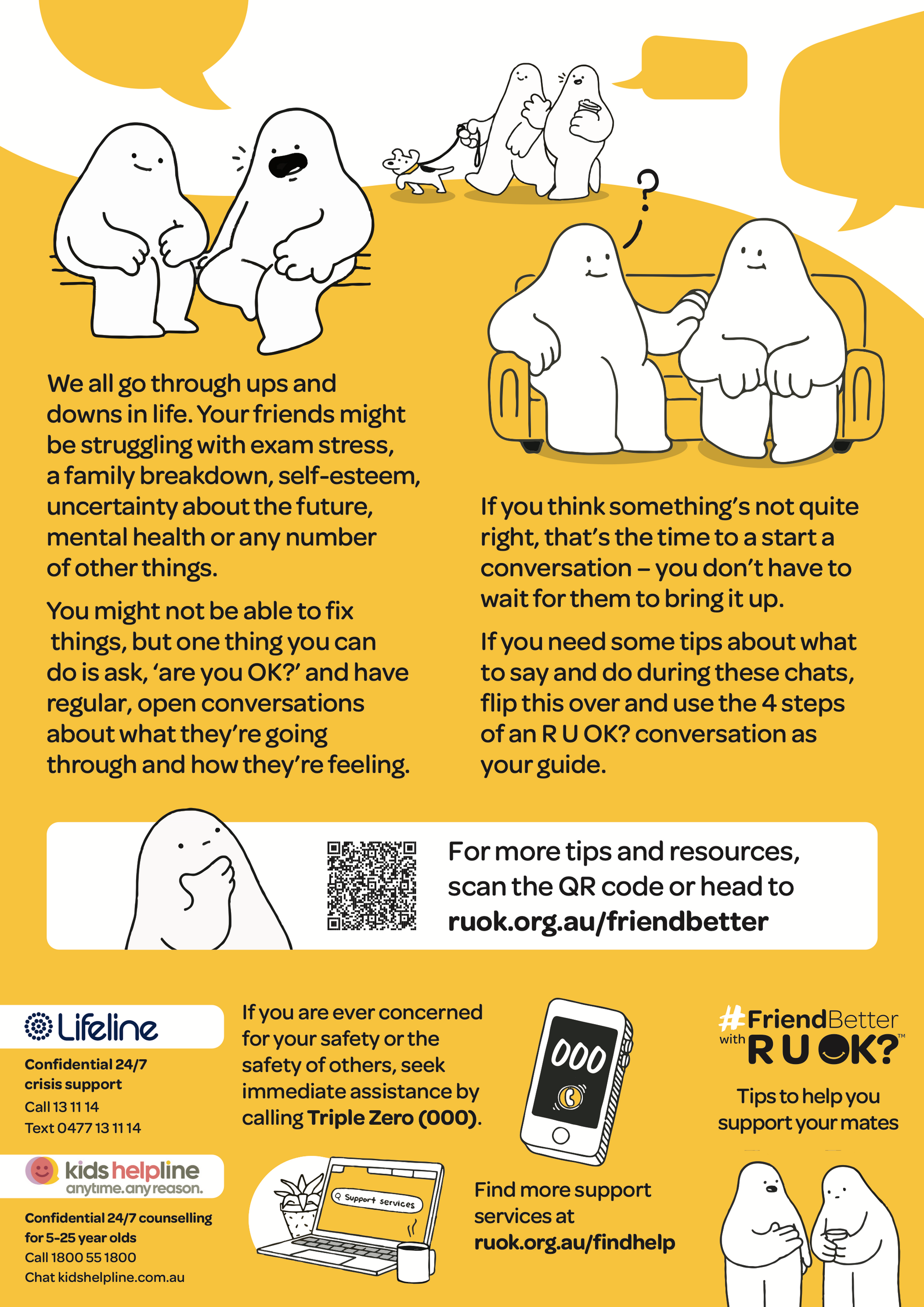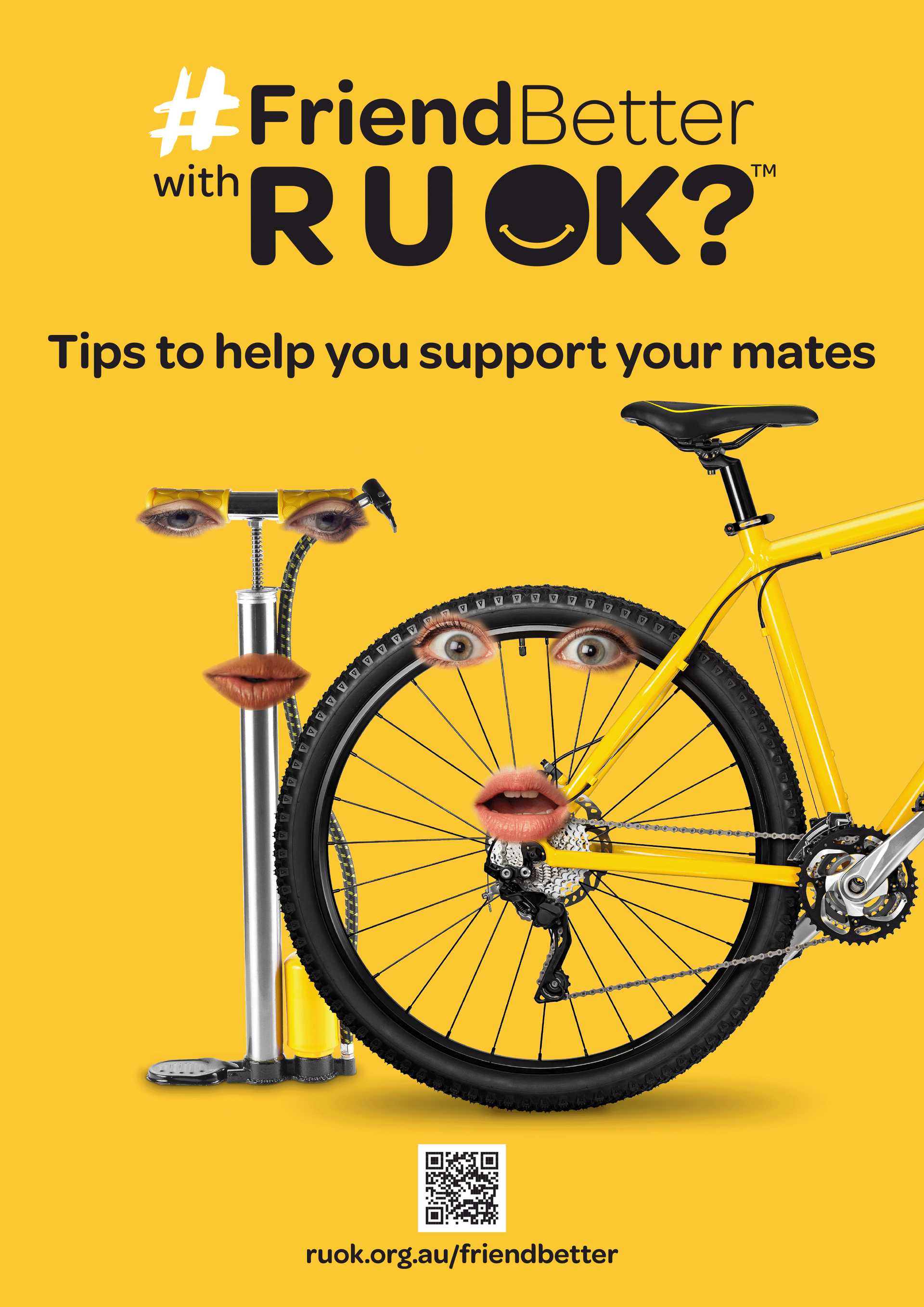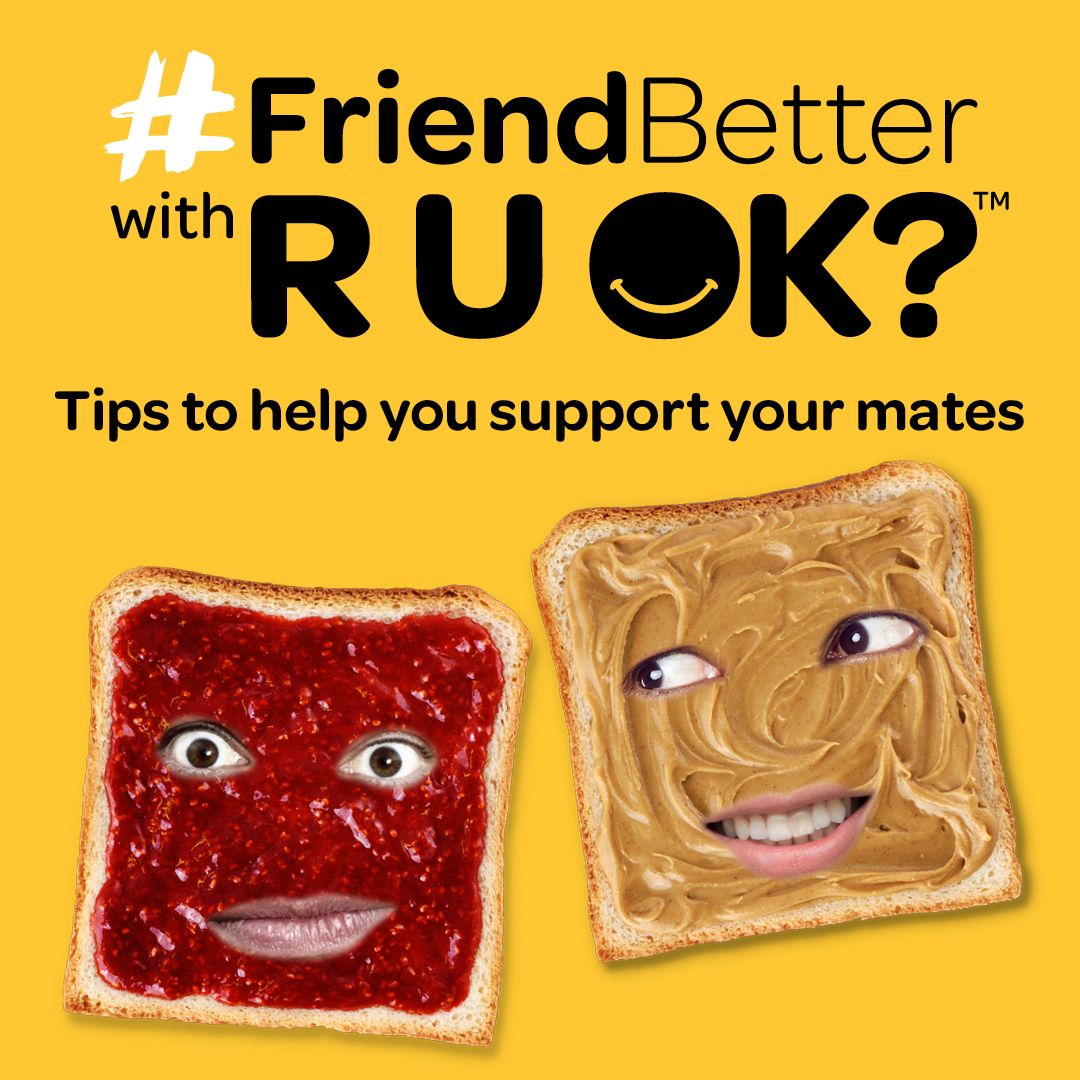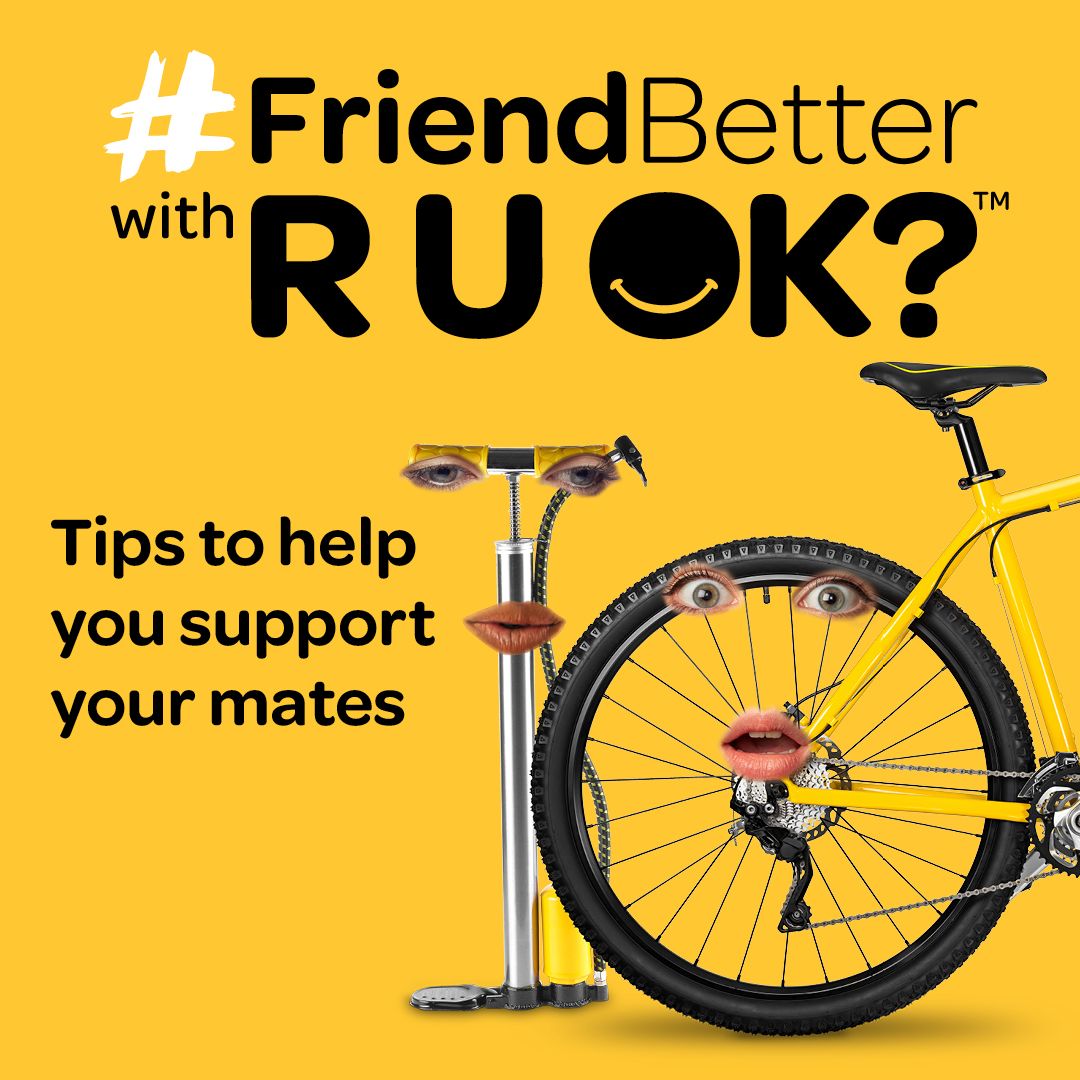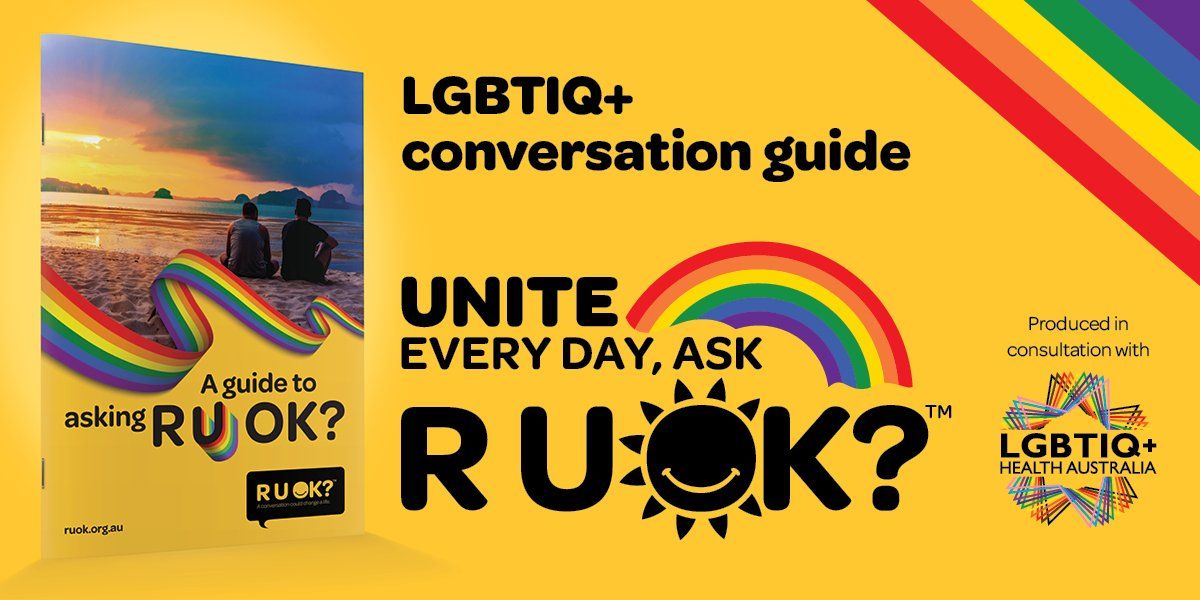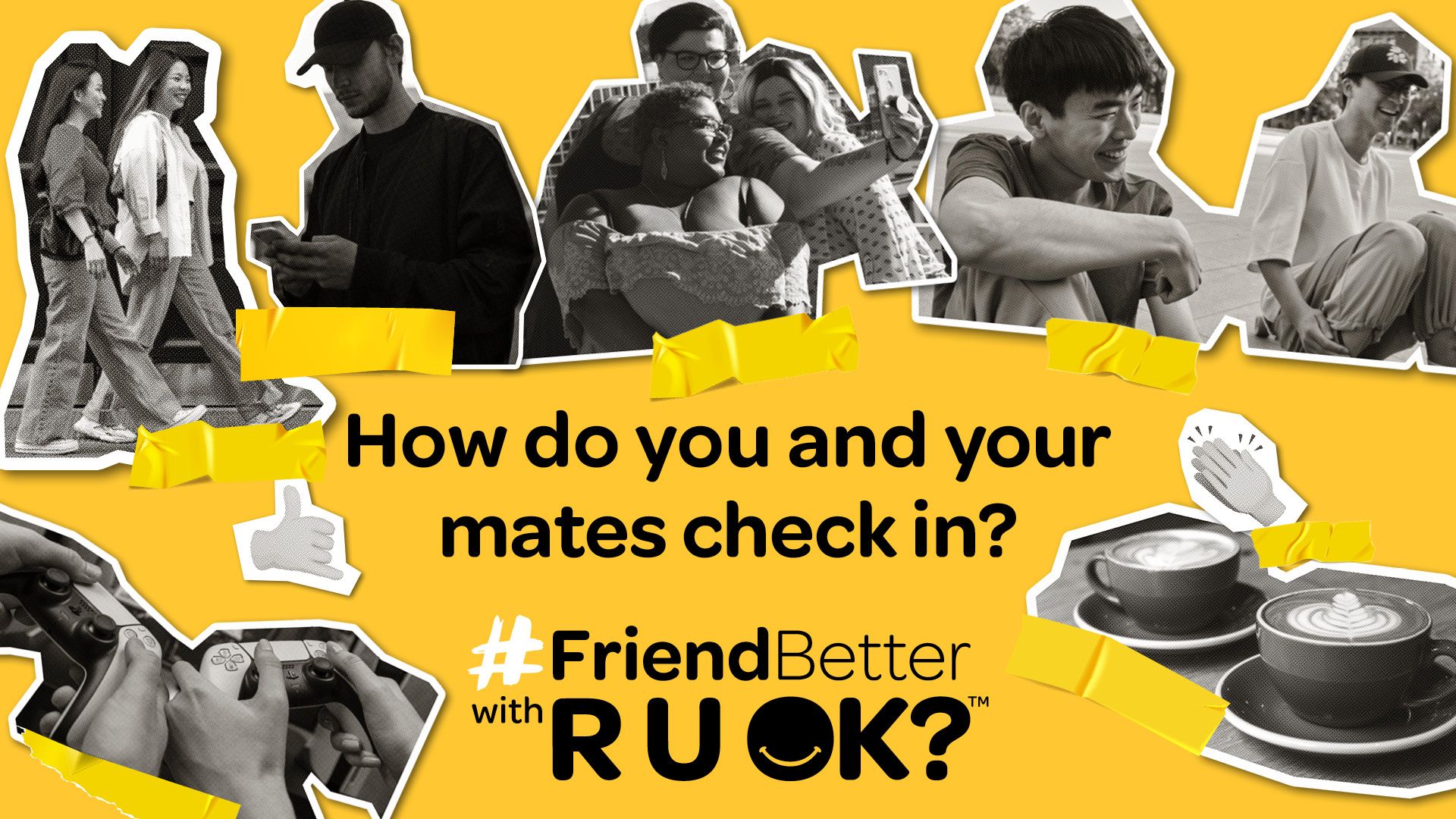
Learn how to #FriendBetter
with R U OK?
Like good friends, some things are just better together. The support of a good mate can help someone feel connected and supported as they navigate life's ups and downs.
This can include exam and study pressure, financial stress, mental ill-health and navigating relationships. We all want to be there for our friends when they're struggling, but sometimes it can be tricky to know what to say and do.
That's why we've put together these resources, to help you #FriendBetter and know how to have those important conversations.
SPOT THE SIGNS
If you feel like something’s not quite the same with a friend – there’s something going on in their life or you notice a change in what they’re doing or saying - trust that gut instinct and take the time to ask them, 'are you OK?'
When someone is struggling it can be hard to speak up and ask for help. By acting as ‘eyes and ears’ and reaching out to anyone who's going through a tough time we can show them they’re supported and encourage them to access help sooner. Learn more about the signs to look out for here.
TIPS TO HELP YOU #FRIENDBETTER
There are different things you can say or do to support your friends, depending on what they are going through.
These eight articles feature practical tips to help you lend support to a mate or young person in your life who is going through a tough time. The eight articles focus on:
- Exploring sexuality and gender
- Exam stress and academic pressure
- Uncertainty about the future
- Financial stress and cost of living
- Suicide bereavement
- Self esteem
- Online behaviour
- Motivation and procrastination
- Navigating relationships
- Mental health
- Loneliness
SEXUALITY AND GENDER
Exploring your sexuality and discovering your identity is a normal part of growing up. While it can be an exciting time, it can also spark feelings of confusion and stress, due to instances of prejudice, stigma, and discrimination. If your friend is exploring their sexuality and/or gender, they might be anxious or fearful of how this might impact their social or romantic relationships, and even their safety. Or maybe they’ve recently come out to you, and you want to make sure they know you love and appreciate them. If you’re wondering what to say and do to support a mate, we’ve got you covered.
ONLINE BEHAVIOUR
We spend a lot of time online, whether it’s chatting with friends, searching the web, scrolling through social media, studying or gaming. Sometimes our interactions online aren’t always positive. Your friend might be exposed to online bullying or trolling, which can seriously impact their self-esteem and mental wellbeing. Maybe you’ve noticed they’re spending a lot of their time on social media or gaming, and as a result they’re not getting enough sleep or losing touch with their hobbies and friends. As a mate, you can spot the signs they might be doing it tough and help them through.
SUICIDE BEREAVEMENT
If someone you know has lost a family member or friend to suicide, they will likely go through a very difficult bereavement journey, full of mixed emotions. As well as grief, feelings such as shock, disbelief, isolation and anger can be experienced. If your mate has lost someone to suicide you might be unsure what to say, or how best to support them. To help you be there for your friend, we’ve put together some important signs to be aware of and tips for how you can offer support.
EXAM STRESS AND ACADEMIC PRESSURE
Never-ending assignments and the crunch time of exams at school, TAFE or university can be stressful. Your friend could be worried about failing or that they won’t do as well as they hope. They might be dealing with pressure from family members or teachers or struggling to understand the things they’re studying. Academic pressure affects everyone differently, and for some, it can be a little overwhelming. If you think your friend might be stressed about study, there’s a few things you can do to help.
FINANCIAL STRESS AND COST OF LIVING
Life is expensive. Managing finances for the first time, juggling work and study, paying rent, rising costs of living and socialising on a budget could be causing your friend to feel stressed. They might be too scared to tell you upfront, but there are a few signs you can look for that indicate they’re worried about money and things you can say to help a mate manage the stress. And no, it doesn’t include you funding their life.
MOTIVATION AND PROCRASTINATION
Motivation is what drives us to make things happen and get stuff done. Staying motivated can be tough. Whilst we all sometimes struggle to get stuff done; tardiness, procrastination, absence and negative comments are just some of the signs your friend could be lacking motivation. There are things you can do to check in and help them out.
UNCERTAINTY ABOUT THE FUTURE
The future can be equal parts exciting and scary, but one thing’s for sure – a lot of what lies ahead in life is uncertain. We’re all different in terms of how much uncertainty we can manage. Some of us thrive on the unknown, and some of us are overwhelmed. Whether it’s study, career, travel, relationships, or broader issues such as climate change – your friend might be stressed about having to make decisions and what the future holds. Knowing what to say and do when your friend is struggling can make the unknown seem less scary.
SELF-ESTEEM
Self-esteem is the opinion we have of ourselves and our abilities. Low self-esteem can leave us feeling pretty down and even impact every aspect of our life. If your friend is lacking confidence, doubting their ability, speaking negatively about themselves or avoiding hard things, they could be experiencing low self-esteem. Building confidence and self-esteem is no easy feat, but having a friend to talk to and offer a helping hand can make the journey easier.
MENTAL HEALTH
It’s normal to feel sad, stressed, angry or anxious every now and then. But if you notice your friend is experiencing these feelings for long periods and it’s starting to affect their everyday life, it’s probably time to check in. Or maybe your friend is open about living with a mental illness (such as depression, anxiety, personality disorder or an eating disorder) and they’re already seeing a professional, but you want to know how you can best support them as a mate.
NAVIGATING RELATIONSHIPS
Managing relationships is a part of life, but that doesn’t mean it’s always easy. Your friend might be dealing with conflict, family breakdown, a break-up, or social anxiety. You don’t have to resolve their issues, but it can be helpful to know what to say and do to support them through a tough patch.
LONELINESS
Our need to connect and feel a sense of belonging is a part of being human. Your friend might have family and mates (like you) around them, but they could also be feeling misunderstood, like they don’t fit in or are left out. Loneliness is about how disconnected we feel, rather than how many people we know. There are signs you can look out for and things you can do to help your friend feel connected again.
FOUR STEPS OF AN R U OK? CONVERSATION
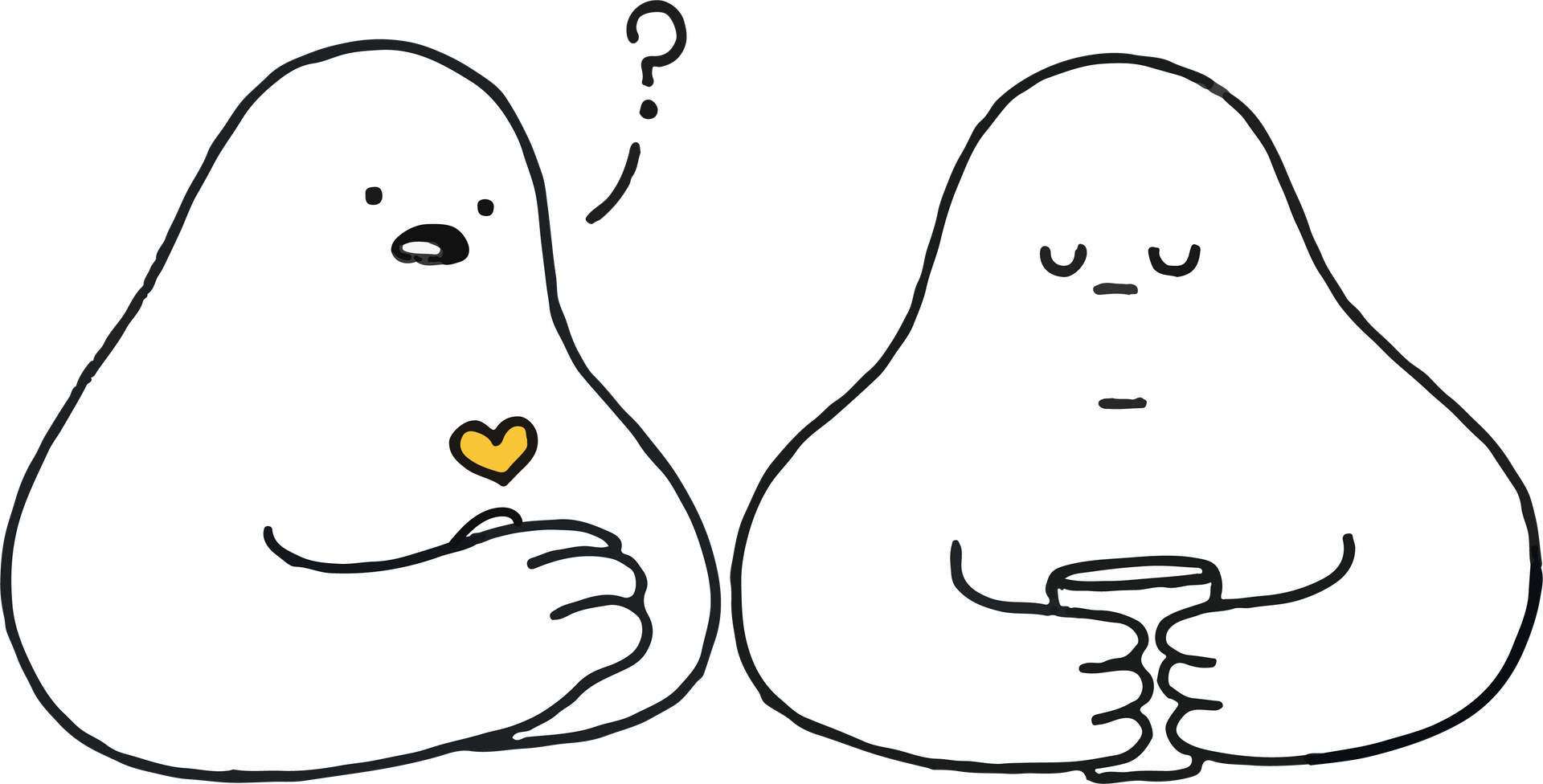
ASK R U OK?
- Be relaxed, friendly and concerned in your approach.
- Help them open up by asking questions like "How are you going?" or "What’s been happening?"
- Mention specific things that have made you concerned for them, like "You seem less chatty than usual. How are you going?"

LISTEN
- Take what they say seriously and don't interrupt or rush the conversation.
- Don’t judge their experiences or reactions but acknowledge that things seem tough for them.
- If they need time to think, sit patiently with the silence.
- Encourage them to explain: "How are you feeling about that?" or "How long have you felt that way?"
- Show that you've listened by repeating back what you’ve heard (in your own words) and ask if you have understood them properly.

ENCOURAGE ACTION
- Ask them what have they done in the past to manage similar situations.
- Ask: “How would you like me to support you?"
- Encourage them to think of at least one thing that could help them lighten the load. Something that’s enjoyable or relaxing. Better yet, do it together!
- If they've been feeling really down for more than two weeks, encourage them to access professional support.
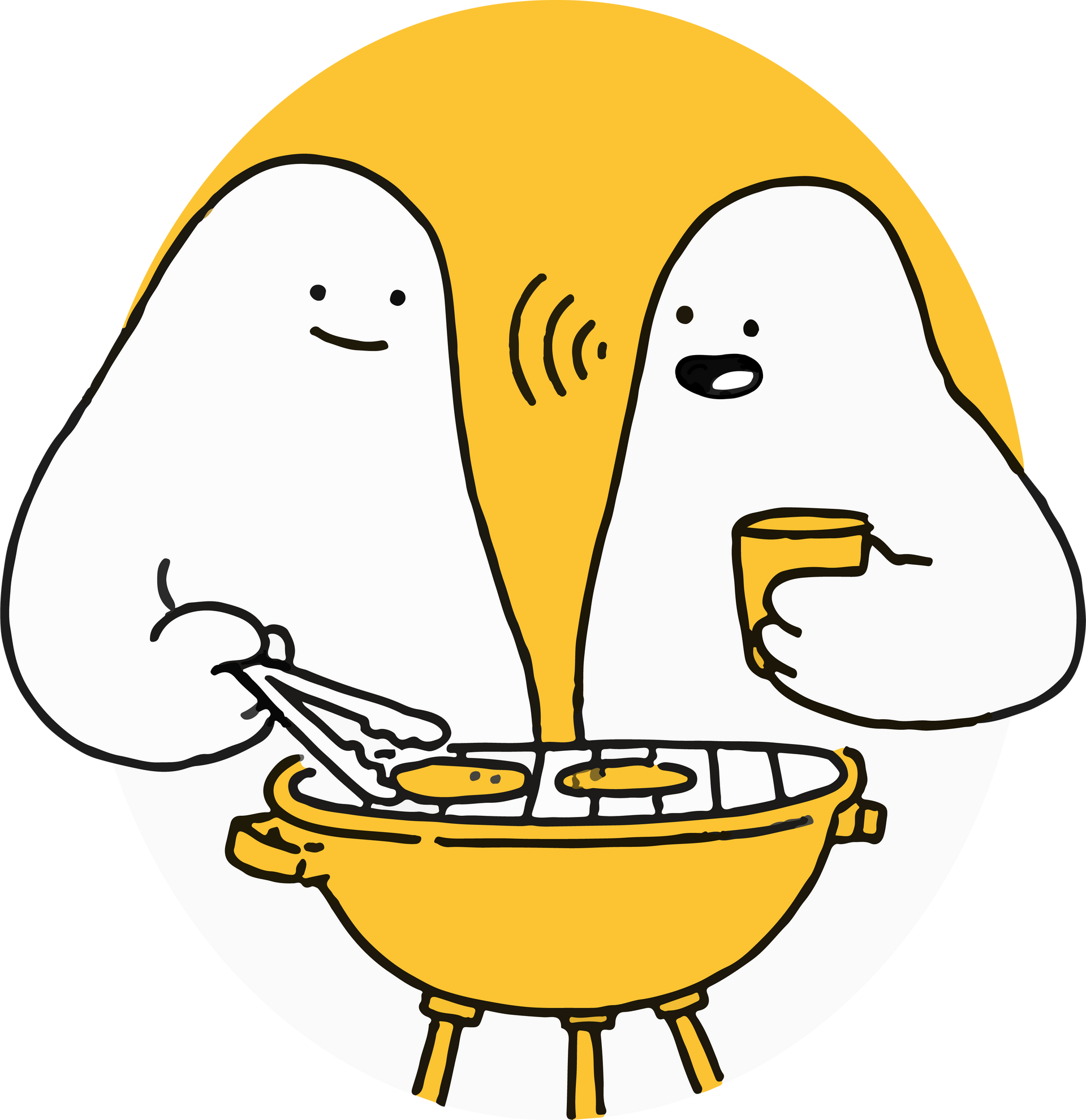
CHECK IN
- Pop a reminder in your diary to call them in a couple of weeks. If they're really struggling, follow up with them sooner.
- You could say: "I've been thinking of you and wanted to know how you've been going since we last chatted."
- Ask if they've found a better way to manage the situation. If they haven't done anything, don't judge them. They might just need someone to listen to them for the moment.
- Stay in touch and be there for them. Genuine care and concern can make a real difference.
YOUTH CONVERSATION GUIDE
Share this conversation guide with your students to help them navigate an R U OK? conversation and empower them to help the people in their world. There are also instructions on how to fold the guide.
RESOURCES
Use these FREE resources to encourage others to #FriendBetter and check in with a mate.They include a youth conversation guide, posters and social media tiles you can share on your socials or DM to a friend.
Posters
Social Media Tiles
LGBTIQ+ RESOURCES
R U OK? is calling on members of our LGBTIQ+ communities and their allies to, ‘Unite every day,
ask R U OK?’.
Everyone goes through tough times in life when we need support and our LGBTIQ+ friends sometimes have to deal with added challenges. An R U OK? conversation can make a difference when someone is struggling and you don’t have to be an expert to show you genuinely care.
We can all play a role in supporting our friends by being a safe, welcoming space for them to turn to for support and for you to genuinely engage with them in an R U OK? conversation.
FIND HELP
It can be hard to talk about how you feel, but is there someone that you trust you could talk to? That can really help.
Kids Helpline (1800 55 1800) is a free and confidential counselling service for young people aged 5-25. You can contact them 24/7 via phone, WebChat or email. Lifeline (13 11 14) is also available for a chat, any time day or night, with phone, text and live chat support options..
You could also connect with a trusted health professional, like your doctor. If you need immediate support, click on
Find Help for 24/7 services.
#FriendBetter with R U OK?’ has been informed by our ‘Connecting Young Australians’ research which sought to understand attitudes towards mental health, barriers to providing support and the issues causing stress for young people.

This campaign was developed with the support of our Conversation Partner, ING Australia.













